Should bid-bots unvote posts on Day 6?

Hi everyone,
I find myself writing another post about bid-bots. I have covered off a lot in my previous posts. My most recent post titled ‘Bid bots and the possible economic implications’ looked at the current situation on Steem with a focus on the effect on curation. The post proposed changing the curation rewards from 25% to 50% to encourage active genuine curation. This is a way of offering an incentive to investors to change their behaviour in such a way that is more beneficial to the platform as a whole.
In today’s post, I want to share my thoughts regarding buying promotion (advertising) compared to buying upvotes. The way the bid-bots currently operate, the two concepts are quite indistinguishable. I am proposing that there should be a difference. I am proposing that difference can be made by the removal of bid-bot votes on Day 6 (I have chosen Day 6 to allow for as much exposure as possible from the bid-bot upvote). In the current environment, those bidding for upvotes get to keep the value of the upvote on payout as well as reap the benefit of greater exposure. If the vote is removed, then all that is being paid for is the exposure. This could also allow vote selling to have its own market as well. Though, I can foresee plenty of problems with a purely voting selling market.
Vote selling market
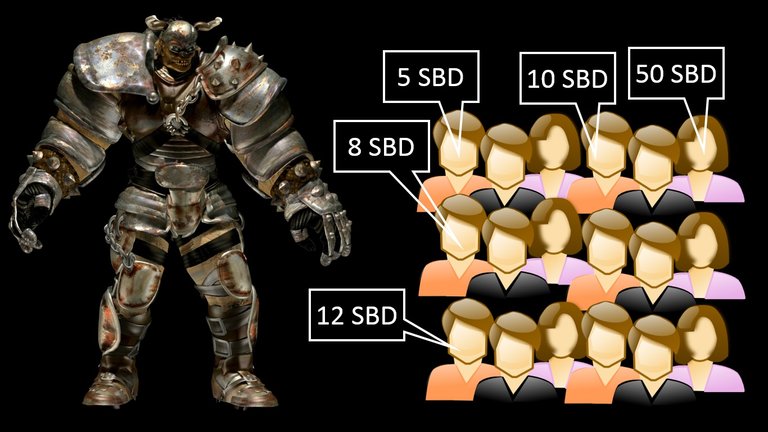
Vote selling is not the focus of this post but I thought I would briefly indulge in the idea before I move onto promotion and advertising through bid-bots.
What could a separate vote selling market look like? Instead of using bots, vote selling could be done manually. People could delegate Steem Power to those offering vote selling services; this would give the vote sellers a reasonably sized upvote. The vote sellers would then price their upvote; I would suggest a fixed price. The vote buyers would pay this price and send a link to the vote seller. The vote seller would then determine the value of the upvote to give, if any, for the submitted post.
Similar vote selling services have been run in the past. Unfortunately, they are very difficult to run as the vote sellers get inundated with posts. A possible way round this problem could be to introduce a vote buyer’s whitelist. A whitelist would reduce the number of potential buyers and make life easier for the vote seller. Creating a whitelist will still require significant work by somebody. I believe operating such a market will be very problematic but not impossible.
Is there an optimal level of delegation to bid-bots?
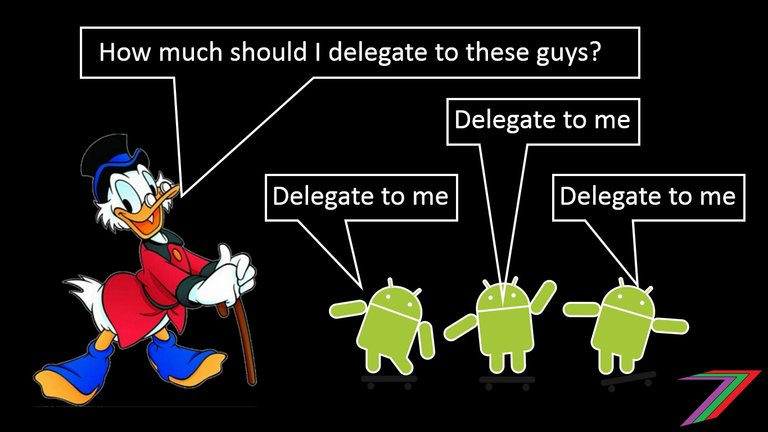
Before I elaborate on why I believe bid-bot vote removal on Day 6 would help prevent market failure of high quality content on Steem, I want to elaborate further on what I mean by market failure.
In 2017, when there were less bid-bots and less Steem Power delegated to bid-bots, bid-bots appeared to be making Steem a better place. The bid-bots offered an opportunity for content creators to get exposure. The posts supported by the community received more upvotes and earned the content creators more rewards. The posts not supported by the community earned very little additional rewards and some were downvoted (downvoting was generally quite rare). The bid-bot upvotes normally produce a positive return in themselves. Therefore, if someone creates a good post,they can benefit from both the exposure (more upvotes) and the positive return from buying the votes. This is a great deal for those bidding for votes.
In fact, this was such a great deal that more and more users decided to bid for votes. In response to this demand, more bid-bots were created and more Steem Power was delegated to bid-bots. Just as bidding for upvotes is a great deal for content creators. Delegating Steem Power to bid-bots also provides better returns than manual curation. Bid-bot owners got a good deal as well, more delegated Steem Power to the bid-bot meant higher curation rewards to the bid-bot owner. Therefore, the increase in demand for bid-bots was met with an increase in supply of bid-bots as well as the delegation of Steem Power. Demand for bid-bots kept increasing and the supply of bid-bots and delegated Steem Power matched that increase.

So how is any of the above a problem? Content creators, bid-bot owners and Steem Power delegators are all getting a very good deal. That statement holds true in 2017. In mid-2018, content creators, some bid-bot owners and Steem Power delegators are better off and some bid-bot owners are getting a very good deal. How has this statement fundamentally changed? Content creators and Steem Power delegators are no longer getting a good deal. They are instead getting a better deal than choosing not to use or delegate to bid-bots.
In my post ‘Bid bots and the possible economic implications’, I discuss prisoner’s dilemma for both content creators and Steem Power delegators. If you want to know about this economic concept, I suggest that you read that post. In this post, I want to focus more on determining if there is an optimal level of Steem Power delegation to bid-bots.
Spectrum Economics hypothesis regarding optimal total amount of Steem Power delegated to Bid-bots

Before I go any further, I just want to clarify the terminology that I am using in this post. I will be using the expression ‘total amount of Steem Power’ fairly frequently. This terminology refers to the total amount of Steem Power being delegated to bid-bots from all users and not the users being discussed.
To explain my hypothesis, I will focus on content creators, investors and bid-bot owners (many people fall into some or all of these groups; for the purpose of this exercise I am keeping them as separate users of Steem). I strongly believe the optimal total amount of Steem Power delegated to bid-bots differs for each group. I will begin with content creators.
Content creators
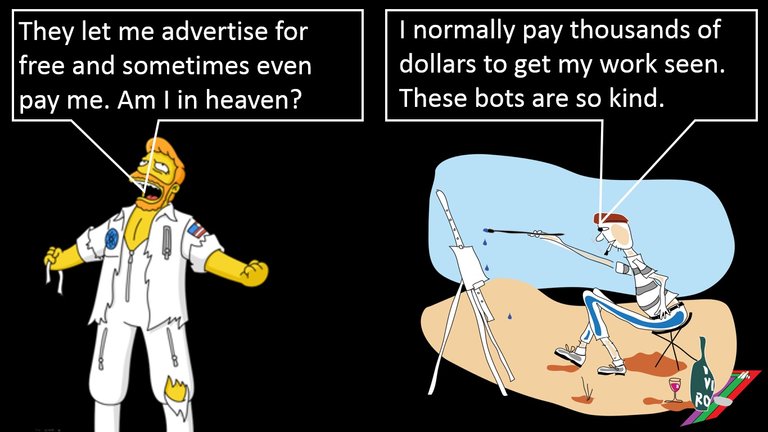
Bidding for upvotes from bots provides content creators with exposure and an upvote that is paid out with the post. Initially, an increase in delegated Steem Power to bid-bots helps a content creator gain visibility. As more Steem Power is delegated to bid-bots, the benefit of receiving visibility is reduced as there is less Steem power available for curation. Less Steem Power for curation reduces returns for both those using bid-bots as well as those not using bid-bots. Therefore, people will continue to use bid-bots (another way of explaining prisoner’s dilemma from the perspective of the content creator).
As more Steem Power is delegated to bid-bots, there is also a higher risk of market failure for high quality content. A lack of curation reduces both upvotes and downvotes. High quality content, which requires considerable effort, will receive very similar payouts to low quality content, which requires very minimal effort. The returns from the bid-bot upvote will become the main source of return for both high and low quality content. Those that do not use bid-bots will receive very few upvotes and returns will be close to zero.
Figure 1 graphically demonstrates my hypothesis in regards to returns to content creators as the total amount of delegated Steem Power to bid-bots increases.
Figure 1: Impact on content creator’s returns as the amount of Steem Power delegated to bid-bots increases

It is important to note that I have drawn the red line (high quality posts upvoted by bid-bots) above the blue line (high quality posts not upvoted by bid-bots) at the same levels of Steem Power delegation to bid-bots. When the green line reaches or gets close to the red line, market failure will occur for high quality content.
Investors

When I say investors, I am referring to those people that have a significant stake in Steem, e.g. Whale and Orca accounts. Delegating Steem Power to bid-bots allows them to function. Bid-bots provide an avenue for good content creators to gain visibility which is good for Steem. As more and more Steem Power is delegated to bid-bots, there is less manual curation of content and less available Steem Power to upvote community supported (high quality) content as well as less Steem Power to downvote low quality content. As we draw closer to market failure, the value of Steem will start to fall as quality content creators are driven away by low rewards and future investors by the lack of quality and attention that content on the platform is receiving.
Figure 2 graphically demonstrates my hypothesis in regards to returns to investors as the total amount of delegated Steem Power to bid-bots increases.
Figure 2: Impact on investor’s returns as the amount of Steem Power delegated to bid-bots increases

I envision a more drastic decline in returns to investors than to content creators. As market failure of quality content is likely to occur at a particular tipping point; whereas, the decline to content creators is more likely to be gradual as the value gained from visibility falls.
The returns to delegating Steem Power to bid-bots will always be higher than curation rewards under the current system. Increasing delegation to bid-bots hurts both those delegating and those not delegating.
Bid-bot owners
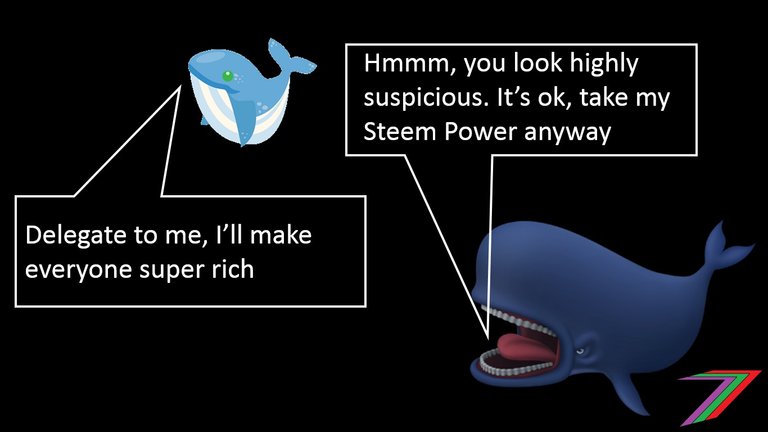
I believe bid-bot owners have the most to gain and the least to lose from the existence of bid-bots. Bid-bot owners with very little invested in Steem have the most to gain. This gain comes in the form of curation rewards from upvotes provided by bid-bots. The rewards to the bid-bot owners increases reasonably proportionately to the amount delegated to the bid-bot. Eventually, when the price of Steem falls because of market failure, bid-bot returns start to fall but not as sharply as those heavily invested.
Figure 3 graphically demonstrates my hypothesis in regards to returns to bid-bot owners as the total amount of delegated Steem Power to bid-bots increases.
Figure 3: Impact on bid-bot owner’s returns as the amount of Steem Power delegated to bid-bots increases

Some bid-bot owners have been around awhile and have accumulated some Steem. These bid-bot owners will experience a decline in returns sooner than new bid-bot owners or bid-bot owners who sell off their returns.
Several bid-bot owners are also witnesses and have gained much of their support from the community based on what they have done in regards to bid-bots.
Comparison of optimal total delegated Steem Power for each group
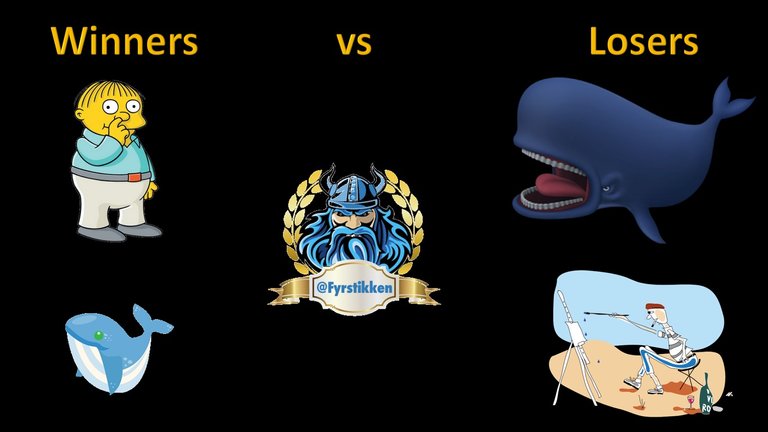
Just to make this clear to my readers, what I am presenting is my hypothesis in regards to the optimal total amount of delegated Steem Power for the three groups of Steemians. My hypothesis is predominantly supported by economic theory rather than data.
My post ‘Bid bots and the possible economic implications’ contains some evidence of low rewards for appearing on tag trending pages, which is the type of exposure most users get from bid-bot upvotes. In regards to the price of Steem, we shall find out fairly soon when the cryptocurrency market becomes bullish. A relatively small increase in the price of Steem could be an indication of the negative impact of market failure in regards to quality content.
I have constructed Table 1 to summarise what I believe should be the optimal total amount of delegated Steem Power to bid-bots for each user. I have used low, medium, and high to indicate optimal amounts. Although this is fairly vague, I am only using this information as a comparison between different groups.
Table 1: Summary of preferred total amount of Steem Power delegated to bid-bots
| Group | Total Delegated Steem Power |
|---|---|
| High Quality Content Creators | Low |
| Low Quality Content Creators | Very High |
| Major investors (Whales/Orcas) | Low to Medium |
| Bid-bot owners (invested) | High |
| Bid-bot owners (not invested) | Very High |
What is advertising?
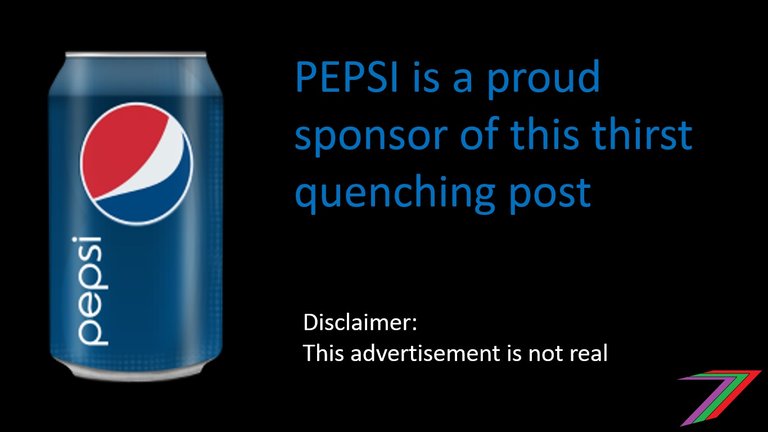
Most forms of social media have some form of option to advertise content. I have a page on Facebook. Almost every time I post to this page, I get a message asking if I would like to boost my post. Normally I am asked if I would like to pay $10 for my post to reach a larger audience. If I pay Facebook, I believe Facebook will promote my post on people’s news feeds. I always choose to decline. Instead, I choose to promote using relevant groups that I have joined. The only paid advertising I have used on social media is on YouTube. I paid YouTube to provide my videos additional exposure, this definitely increased the number of views my videos received but not the number of likes or subscriptions to my channel. The advertising was too broad as my content is designed for a particular audience.
All advertising, including advertising on social media, is a payment for exposure and visibility. Steemit has a ‘Promoted’ page. Those that pay the highest promotion fee get to top this page. This form of advertising has proven to be very unsuccessful. To get near the top of the ‘Promoted’ page normally requires a payment of over 50 SBD. I have yet to see a post recover the cost of advertising. The ‘Promoted’ page is very difficult to find on busy.org, I could not find a link on the front page.
Advertising through bid-bots is completely different from any other form of advertising. There is risk involved in advertising. This risk is reduced by providing something people actually want. Promoting through bid-bots is missing this important risk element of advertising. A person can promote a really bad post and not lose money. This is because the payment for advertising is returned in the form of an upvote. Most low quality content is generally not heavily downvoted by the community. No other form of advertising, that I am aware of, offers this form of security to the advertiser. It is also this form of security that creates a market for low quality content. The market created for low quality content is driving the demand for bid-bots and delegated Steem Power to these bid-bots.
What would happen if bid-bots unvoted on Day 6?
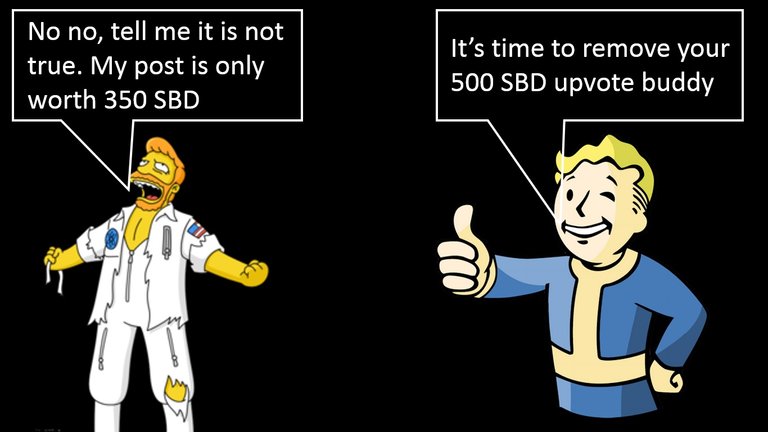
If bid-bots unvoted on Day 6, users would only be paying for the promotion of their content (advertising) and not the upvote. This would no longer be considered as voting selling; it would be more like vote renting. The use of bid-bots would still be a more effective and profitable form of promotion than the use of the Steemit promotion tool.
The use of bid-bots would no longer be a prisoner’s dilemma for either content creators or investors. Using bid-bots could only be profitable for content creators that produce content supported by the community. For bid-bot usage to be profitable, the value gained from upvotes, from improved visibility, needs to be higher than the bid for the upvote to the bot. The demand for bid-bots would fall dramatically. This fall in demand will be a disincentive for investors to delegate to bid-bots as their return from delegation will fall as less money is paid to the bid-bots for their services.
Figure 4 contains the effect on returns to content creators from bid-bots removing upvotes on Day 6
Figure 4: Impact on content creator’s returns, if bid-bots unvote on Day 6, as the amount of Steem Power delegated to bid-bots increases
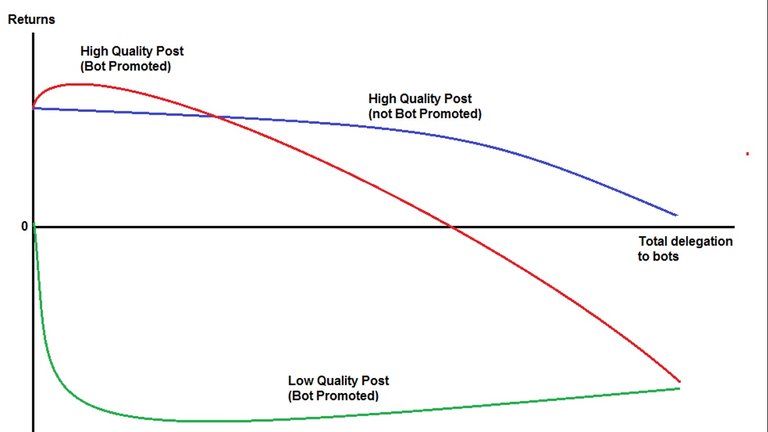
In Figure 4, the red line (high quality posts upvoted by bid-bots) starts off above the blue line (high quality posts not upvoted by bid-bots). I have assumed that if Steem Power is not tied up in bid-bots, it is available for curation. Gaining attention should attract upvotes supported by that Steem Power. If the post is very popular, the value of the upvotes should cover the cost. As more Steem Power is delegated to bid-bots, there is less Steem Power available to support posts. Eventually, even very high quality posts will not be able to cover the costs of advertising. This is graphically represented by the red line falling below the blue line. This may not occur immediately as the cost of using bid-bots will fall as more Steem Power is delegated. This now takes me to Figure 5. Figure 5 contains the effect on returns to investors (potential or actual delegators of Steem Power to bid-bots) from bid-bots removing upvotes on Day 6
Figure 5: Impact on investor’s returns, if bid-bots unvote on Day 6, as the amount of Steem Power delegated to bid-bots increases
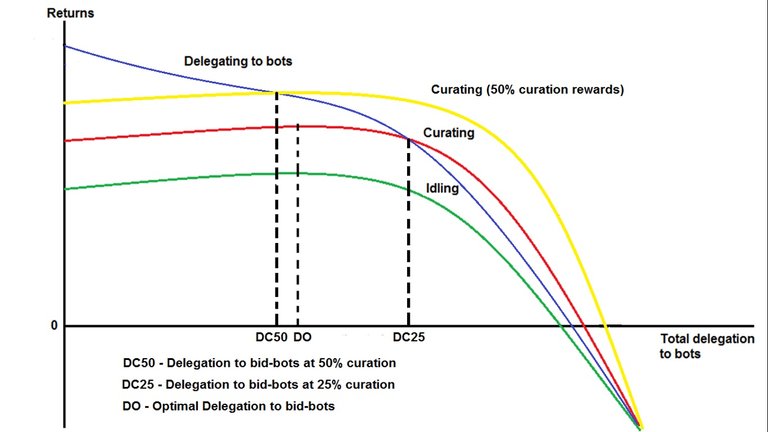
If demand for bid-bots is greatly reduced, so are the potential earnings from delegating Steem Power to bid-bots. As more Steem Power is delegated to the bid-bots, returns to delegators will shrink as the bids are spread across more delegators. Eventually, payments will fall below that of earning curation rewards (blue line falls below the red line). I have also included a line representing returns from curation at 50% curation rewards (yellow line). If curation rewards were 50%, the incentive to delegate to bid-bots would be even less. The blue line may also shift downwards and there may not even be a market for bid-bots at all. Bid-bot owners would most likely split the 50% curation rewards with their delegators to maintain the blue line as shown in the graph.
What would be the cost of promotion using bid-bots?

Removing bid-bot upvotes on Day 6 will reduce demand for bid-bot services. This reduction in demand will result in a lower upfront cost of advertising but the overall cost will be higher as the upvote is removed before the post pays out. Figure 6 shows the demand for bid-bot upvotes if they are removed compared to the price if they remain.
Figure 6: Price of upvotes depending on if upvotes are removed on Day 6
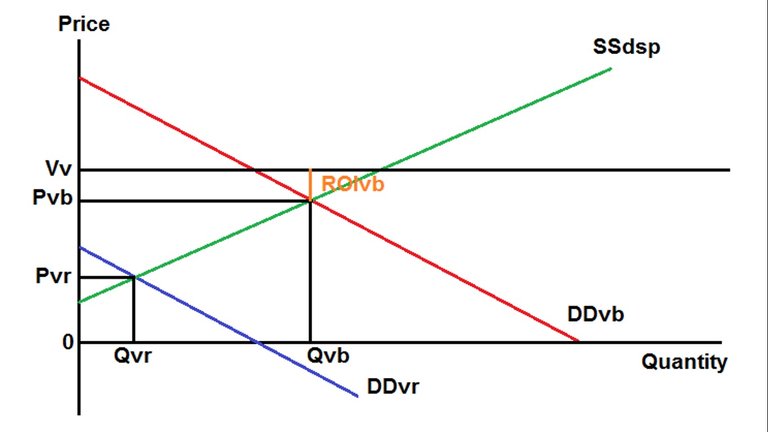
Vv – Value of upvote
Pvb – Price of upvote if upvote is not removed on Day 6
Pvr – Price of upvote if upvote is removed on Day 6
Qvb – Quantity of upvotes sold if upvote is not removed on Day 6
Qvr – Quantity of upvotes sold if upvote is removed on Day 6
ROI – Return on investment from buying upvotes if upvote is not removed on Day 6
DDvb – Demand for upvote if upvote is not removed on Day 6
DDvr – Demand for upvote if upvote is removed on Day 6
SSdsp – Supply of delegated Steem Power at various prices
Demand for upvotes from bid-bots will be significantly lower if the upvotes are removed on Day 6. This lower demand will reduce the price of an upvote as there will be less accounts bidding to obtain these upvotes. The accounts that bid for upvotes will only do so if they believe they can recover the cost of the upvote. This should help quality content rise to the top.
Reputation Effect

Bid-bot upvotes artificially raise an account’s reputation. If the upvotes are removed, the reputation affect is also removed.
In the current system, the reputation of accounts that frequently use bid-bots are greatly overvalued. The reputation score in Steem does not take into consideration votes that have been bought. Therefore, the reputation score is not an accurate representation of the quality or the popularity of the content produced by an account. Removing upvotes on Day 6 will prevent further distortion of the reputation score.
Potential problems with promoting content on the Steem blockchain
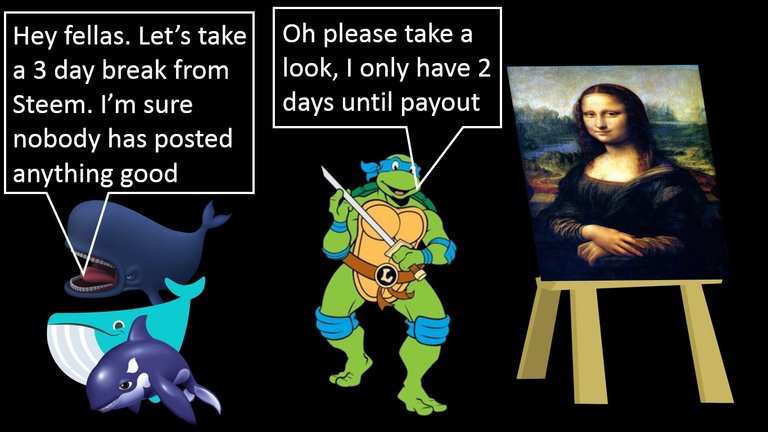
I can envision two potential problems. The first problem is the high concentration of Steem Power with just a few accounts. A high quality post may not earn high rewards if it goes unnoticed by those with the most Steem Power. This greatly increases the risk of losing money from using bid-bot services. If Steem Power was more broadly spread out, the risk of not catching attention is greatly reduced. I mention in my previous posts that the concentration of Steem Power with a few accounts will eventually be resolved as the platform matures.
The second problem, which in many ways is an extension of the first problem, is that the Steem platform may not have a sufficient number of users for advertising to be worth the cost. As the platform matures, this audience is going to grow. This growth will make advertising a more viable option.
Potential resistance to a proposal to unvote on Day 6

I believe a proposal to unvote bid-bot upvotes on Day 6 will be met with resistance from a few groups of people. The two groups I believe that would be most opposed would be bid-bot owners and creators of low quality content. These two groups stand to lose from such a proposal. I also believe there would be resistance from those that perceive the removal of upvotes to be against their interests; this could include some investors and even good quality content creators. I hope the post has addressed concerns from these parties.
Opposition from bid-bot owners

The decision to unvote all posts upvoted by a particular bid-bot sits directly with the bot owners and indirectly with the delegators of Steem Power to that bot. Unvoting posts, as I explained earlier, is to the benefit of those delegating Steem Power. Unvoting posts is to the disadvantage of the bid-bot owners as it reduces demand for their services. Bid-bot owners have direct control over how their bots operate but they are also under pressure to please those delegating Steem Power to them.
Investors can simply decide to only delegate to bid-bots that remove upvotes on Day 6. This would put pressure on bid-bot owners to unvote on Day 6. This approach would only be effective if enough investors are willing to support this action. Otherwise, we would create a new prisoner’s dilemma where bid-bots that did not unvote on Day 6 would attract all the bids, which would then attract all the Steem Power delegation. Hence, we are back where we started.
Steemit Inc could get involved and downvote all bid-bot upvoted posts on Day 6 by the exact value of the bid-bot upvote. This would have a similar effect as removing the upvotes. Though, this would be very costly in terms of Voting Power and time. I have also pondered over ideas such as setting all upvotes from bid-bots as ‘declined payment’ or for payments to be automatically sent to ‘null’. Such actions I believe would be impossible for several reasons. These reasons include:
- being able to perfectly identify all bid-bots
- creating the capability of sending rewards from one post to different accounts (sending to null suggestion)
- having multiple settings on a payout
A total ban on bid-bots could be put in place but that could make the situation worse as vote selling would become less transparent. A ban might be more effective if Steemit Inc started their own bid-bot promotion service. This service would remove upvotes on Day 6 as suggested. In the long-run, creating a monopoly on a particular service is not a good idea. This also goes against the idea of decentralisation of power, which is one of the greatest things about the Steem blockchain.
Opposition from low quality content creators
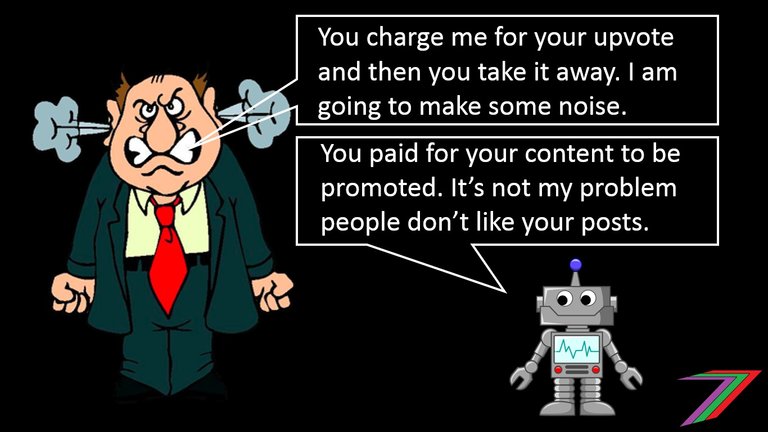
Unvoting bid-bot upvotes would essentially exclude low quality content from receiving upvotes of any value (unless these content creators are whales or are friends with whales). Considering the number of these users currently on the platform, I would expect quite a bit of noise. There is very little these users could do to prevent this proposal from taking place. I would expect them to either stay and no longer use bid-bots or to leave Steem. The damage to the Steem platform of such actions will be quiet minimal.
Should bid-bots unvote posts on Day 6?
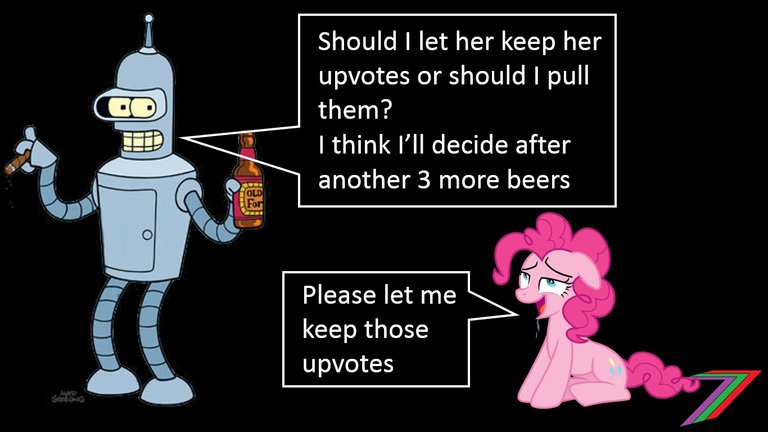
Let’s revisit the original question asked in this post. Unvoting bid-bot upvoted posts on Day 6 would certainly align the service of bid-bots with the function of promotion and advertising. Bid-bots would essentially be renting upvotes instead of selling them. The upfront cost of obtaining a bid-bot upvote would fall as the demand for the service falls. This would make advertising more accessible to those with less available SBD. As the upvote is removed on Day 6, there is much stronger incentive for producing higher quality content as upvotes will be needed to cover the cost of the bid; this is how advertising works everywhere else.
There are certainly plenty of benefits to the community from having bid-bot services that unvote on Day 6. So, in my opinion, I strongly believe that removing upvotes on Day 6 should take place. For the remainder of this post, I will refer to the service provided by bid-bots that unvote on Day 6 as renting of bid-bot upvotes for the purpose of promoting content.
Will bid-bots provide a service of renting upvotes for the purpose of promoting content?
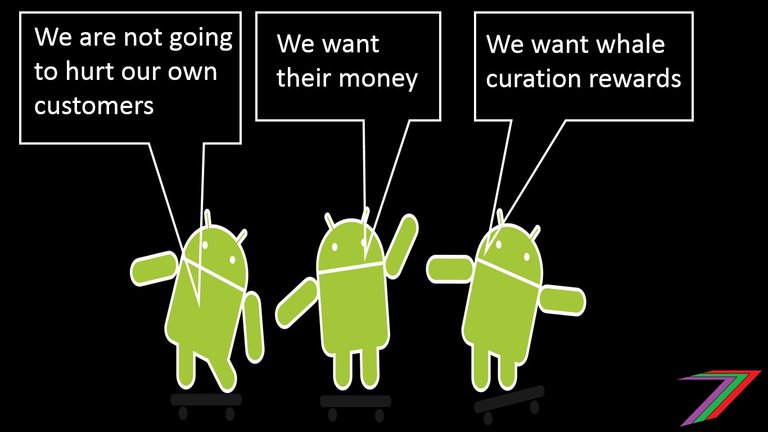
I think it is highly unlikely that bid-bots will rent upvotes. This is simply because in a world where both selling and renting upvotes exist, selling upvotes will be more profitable than renting them. This is because the demand for buying these upvotes will be greater and this demand will attract delegated Steem Power to vote selling rather than vote renting. If we compare two worlds, one world with only vote selling and one world with only vote renting. The world with only vote renting would be better off than the world with only vote selling. This is because vote selling has far higher negative externalities than vote renting.
Negative externalities are the costs to those not involved in a particular market. In this post I am referring to the cost that buying upvotes from bid-bots has on those not buying upvotes and those not delegating Steem Power to support those upvotes.
Externalities of a shared rewards pool
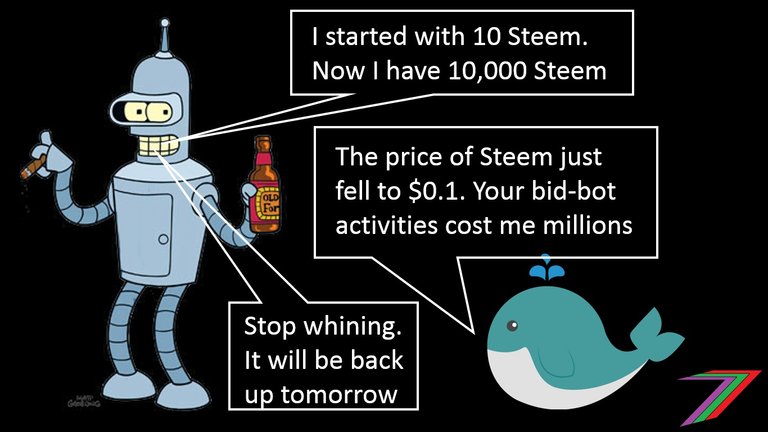
I believe a discussion on the externalities of a shared rewards pool deserves its own post. For this post, I will discuss externalities in the context of bid-bots. Negative externalities of the rewards pool is one of the reasons why we keep running into the prisoner’s dilemma problem. Any user with Steem Power can choose to either reward themselves or others. Rewarding yourself is beneficial to yourself but could be detrimental to the Steem community. Delegating to whatever returns the highest Steem is in the interest of the user but could be hurting the rest of the community.
Delegating to bid-bots that sell upvotes will reap higher rewards than delegating Steem Power to bid-bots that rent upvotes (remove upvotes on Day 6). This is because there will be a higher demand for vote selling services because the content creators get to keep the upvote. If operating in the same environment, keeping the upvote is a better deal for the content creator. This comes back to the problem of negative externalities. Those not involved with vote selling are hurt by those that buy and sell votes; this is our negative externality. Those not involved in vote renting are hurt considerably less as the rewards pool is replenished after the unvote.
Conclusion

This brings me to the end of yet another long post regarding bid-bots. I got fairly deep into the economics of the effect that delegating Steem Power has to bid-bots as well as the implications of what would happen if bid-bots unvoted on Day 6. If what I have hypothesized is correct, Steem is going to suffer quite badly if the amount of Steem Power delegated to bid-bots continues to increase. Unvoting bid-bot upvotes on Day 6 seems like a solution that would be effective. The biggest problem with this solution is that the thinking that has created this problem (desire for short-run gains over the long-run growth of the platform) would have to change. As long there is a prisoner’s dilemma pulling towards a particular action, change is going to be very difficult.
So far I have discussed excessive delegating of Steem Power to bid-bots as a problem. I believe that this might be a symptom rather than the actual problem. I briefly discuss externalities in relation to the rewards pool towards the end of this post. I will explore this in far more detail in another post.
Thank you for taking the time to read this post. I appreciate any feedback that you have to offer.
Below are links to my other recent posts regarding the Steem platform. Feel free to have a read, most of the ideas I have expressed in my previous posts are consistent with the views I have shared in this post.
Here is the link to the post ‘Bid bots and the possible economic implications’
Here is the link to the post ‘The trending page aka the front page of Steemit’
Here is the link to the post ‘Changing the way voting works to improve fairness and rewards – My little fantasy’
Here is the link to the post ‘Steem explained by an economist’






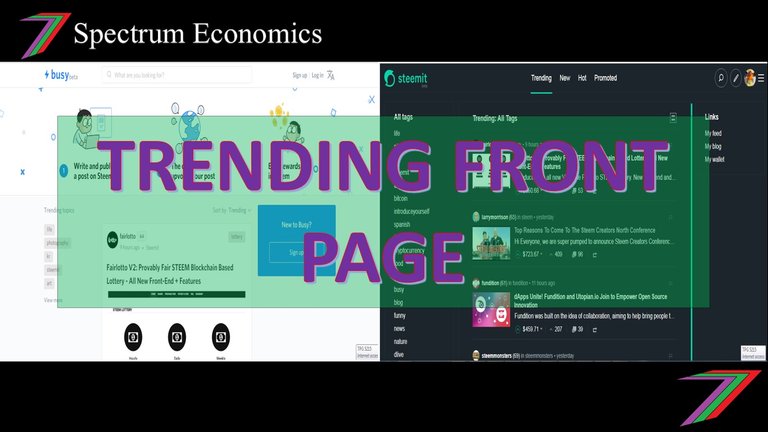
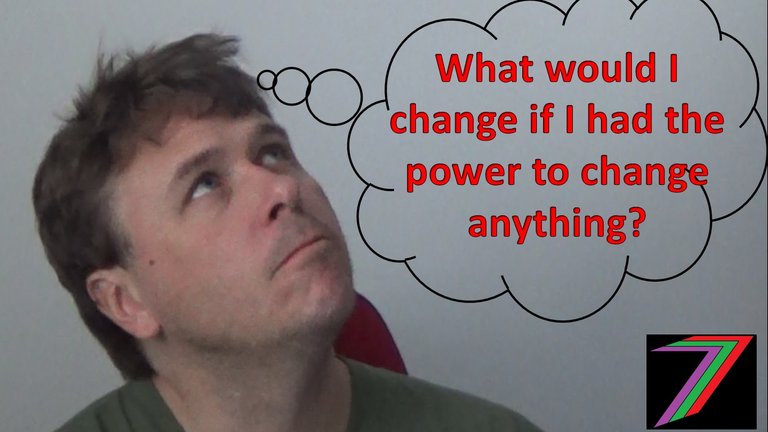

I like this idea too. Promotion as promotion. But it's also why I like the idea of just putting promoted into trending in some form :)
You mentioned PD for bid bots, and I do remember the previous article roughly as well, but do you see the same when discussing in more generality, to say self voting? Maybe you have discussed previously but I'm not sure and searching only reveals a discussion about bid bots.
Would be interested to see what you think. Cheers.This seems loosely related to my rambling in this post, but I'm sure you may have a better economic lens than I for it: https://steemit.com/steem/@eonwarped/inflation-as-a-platform-cost-another-look-at-stake
I see self-voting and delegating to bid-bots to be very similar. Both actions involve self-rewarding. I see bid-bot delegation to be worse as at least self-votes can be downvoted. Self-voting normally requires some effort to generate content to be self-voted. Delegating to bots involves no work by the delegator, they just sit back and earn.
Delegating to bots and self-voting by large accounts is remarkable shortsighted behaviour. Sure this more earns more Steem but it also destroys the value of Steem. To me it feels like shareholders that are only interested in accumulating shares at the expense of their own company.
I've had a quick look at your post. You have raised some very interesting points. I am not in favour of a pure 1 vote by 1 account approach to voting. I beleive that those with more invested should a have a greater say in regards to how rewards are distributed. I think that this influence should not necessarily be in the form of larger valued votes but instead in the form of a greater number of votes. These votes could be allowed to be delegated to others but the delegator of the votes gets to earn the larger proportion of the curation rewards. Here is a link to that post https://steemit.com/steem/@spectrumecons/changing-the-way-voting-works-to-improve-fairness-and-rewards-my-little-fantasy.
This is the money quote. 100% agreed here.
The interesting thing I was realizing though in my discussion with @tcpolymath was that the % stake is by default decreasing over time, and it may be why they have this mentality, not sure.
Concerning 1a1v, I only think it's an interesting setup that is more directly tied to engagement value of post, but it does raise concerns about what value staking has. Your idea seems interesting, I'll have to ponder about it a bit... Thanks for the reference!
Except Steem is a currency, not an ownership token. There are no investors and no company in that sense. Every investment here, every company here, is an individual, independent account or collection of accounts investing in itself with Steem. Nobody except Steem Inc.'s ownership is investing in Steem, and even they're a little fuzzy about it. Absolutely none of us have any fiduciary responsibility to Steem, if it could even be identified as an entity.
Self-voting in that sense is a choice to reinvest in your own company rather than spending that money on marketing. Maybe that last comparison is stretching the metaphor a little, but outgoing votes are actually way better marketing than any number of posts bought into Trending. The vote-buy-as-promotion thing is pretty much a myth.
But there's a weird thing about having Vests as our core resource where reinvesting in them now can boost our marketing budget later. So I see a huge distinction between self-voting to power up and support later plans, and self-voting to cash out.
Shareholders vote on the direction of the company, and analogously, we as participants on the Steem blockchain vote in ways that influence the currency/platform (stretching a bit).
It's an interesting way to look at self voting, but if one is already giving out going votes and networking, is there a need to self vote given that others will likely reciprocate?
Though I would certainly prefer a self voter that gives back to the community than one that is just sitting on one's own throne, that's for sure.
This is a very good point, it's certainly better. But I do think that promoting to trending as exposure still works. It's something I have been thinking about recently... Instead of what we see on trending, is it worth pooling resources to send what we would like to see up there?
At the moment there's still the timing issue which makes a self-vote more powerful since it comes quicker. If HF20 does away with that I plan to stop voting on my own posts. I'll still buy votes as long as it's a more efficient way of getting SP than powering up, though.
My feeling is that optimal Trending strategy involves either ignoring it or trying to replace it with a better concept. Ignoring it is optimal strategy on every other platform, so it seems like it should be here, too.
Congratulations! Your post has been selected as a daily Steemit truffle! It is listed on rank 13 of all contributions awarded today. You can find the TOP DAILY TRUFFLE PICKS HERE.
I upvoted your contribution because to my mind your post is at least 35 SBD worth and should receive 202 votes. It's now up to the lovely Steemit community to make this come true.
I am
TrufflePig, an Artificial Intelligence Bot that helps minnows and content curators using Machine Learning. If you are curious how I select content, you can find an explanation here!Have a nice day and sincerely yours,

TrufflePigWow, 35 SBD would be amazing. I really hope that happens. Thanks for the exposure @trufflepig.
What an in depth article. I too disagree with the prevalence of bid bots in the platform. It’s going to eventually destroy the platform, there will be hardly any decent content. I’ve already stopped bothering to go to the trending page for over a month. The catalyst for me was some guy promoted a post about eating fast food in a super expensive car. It was #1 on trending, seriously?! I said no more after that, that’s not the content that should be at the top of trending.
I found your post via truffle pig, the only valuable bot I’ve seen on the platform thus far.
The trending page is in a very bad place right now. I find it very strange that the whales delegate to bots and therefore allow awful posts to gain the most exposure which will destroy the reputation of the platform and their own wealth. What is the point of collecting as much Steem as possible if it is not worth anything?
Truffle pig is quite a useful bot. I am becoming a regular choice.
Agreed. I like this platform but not everyone feels the way I do and I’ve noticed there’s a lot of negative fluctuations in the price of Steem. I’ve been on the crest of 20$ in account value and I cross it for a couple hours and it goes down. There are multiple forces involved but those with lots of holdings on this platform aren’t helping it mature very much.
Excellent post an analysis. The idea of unvoting after the 6th day is interesting.
I think there also other ways to investigate, for instance, what about putting a maximum allowable percentage of SP to be delegated by any account.
I mean, obliging to not overpass for instance a 25% of the SP steak in delegations would allow the delegators to get reasonable profits and keep curating, I guess...
There are many ways to find a better and balanced approach.
I think there are many possible solutions. It is very difficult to know what is going to work best. Everything about Steem is so new to everyone. I think there will be plenty of trial and error before we get it right.
Im really just sick of meaningless content - and posts about how steem works. It discourages new writers coming in while building up an atmosphere of smugness in the steem community. Getting rid of bots is a good idea a great start, but i would really like to see steem reach out to bloggers on other sites like say wordpress. Get more writters, whom can diversify the platform talking about all kinds of things other then just steem.
The growth of Steem is currently being stunted because of low quality content being bot upvoted to the front page.
Posts about Steem are very popular with the early adopters. I think people need to be informed on how the platform operates but it would be better for these posts to be pinned somewhere for easy access so that the trending page can be reserved for more diverse content that will appeal to a much larger audience.
Thanks for sharing good article
No problem.
even if my curation awards doubled they would still be pretty paltry and if I got 25% less on a post that would be quite discouraging.
I am hoping that the value your posts gain from more curation will more than compensate you for the loss from the higher curation rewards.
my curation rewards, and I often win an award for curation, are projected at .307 sp or 36 cents, so if it doubled I would get another 36 cents
if curation awards went from 25 to 50% then I would lose 2.135 sp
so I would lose about 6 times as much under that scenario.
If the pending payout of you post increases by 50% you will be better off. I believe this is quite possible as more curation will take place if the curation rewards are higher.
but even if doubled curation awards are basically meaningless unless you are operating a bot or something. I don't think people would be very motivated by another 36 cents.
Another 36 cents wouldn't motivate many but that's not the audience this approach is targeting. I'm thinking of the whales that are currently earning only 200+ Steem a week from curation. With 50% curation rewards they could be earning 400+ Steem a week; an additional 200+ Steem. This should encourage some of them to undelegate from bots and actively engage in curating content.
have any whales weighed in on the idea?
Congratulations @spectrumecons! You have completed the following achievement on Steemit and have been rewarded with new badge(s) :
Click on the badge to view your Board of Honor.
If you no longer want to receive notifications, reply to this comment with the word
STOPI wish many people could find this post.
It takes time to become well known. I have only been on Steem for 14 months.
Well don't know what's gonna happen in future but steemit might die slowly due to over use of it for sure
That is a possible outcome. I think people are going to see the decline as it is becoming very obvious.
It is so strange that so many whales are more interested in accumulating Steem through payments from delegating to bots than trying to increase the value of Steem by promoting the best content. It is like a businessman more interested in gaining shares in his own company than improving operations.
Oh heavens!
I did not know the great impact that this had
The potential impact is huge. At the moment we are witnessing very low quality content reaching the top of the trending page. This is happening because there is very little risk involved. Payments for advertising are being returned on payout. This is then used to buy more upvotes for more low quality posts.
For Steem to thrive as a social media platform, the content on the trending page needs to be supported by the community. This will then encourage more people to join the Steem community.
this post should have gotten a few hundred dollars as a reward? what a genius idea.